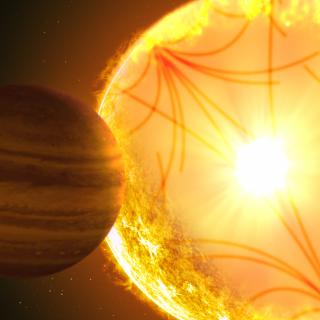Bibcode
Cabrera, J.; Fridlund, M.; Ollivier, M.; Gandolfi, D.; Csizmadia, Sz.; Alonso, R.; Aigrain, S.; Alapini, A.; Almenara, J.-M.; Barge, P.; Bonomo, A. S.; Bordé, P.; Bouchy, F.; Bruntt, H.; Carone, L.; Carpano, S.; Deeg, H. J.; de La Reza, R.; Deleuil, M.; Dvorak, R.; Erikson, A.; Gillon, M.; Gondoin, P.; Guenther, E. W.; Guillot, T.; Hartmann, M.; Hatzes, A.; Hebrard, G.; Jorda, L.; Lammer, H.; Léger, A.; Llebaria, A.; Lovis, C.; Magain, P.; Mayor, M.; Mazeh, T.; Moutou, C.; Ofir, A.; Pätzold, M.; Pepe, F.; Pont, F.; Queloz, D.; Rabus, M.; Rauer, H.; Régulo, C.; Renner, S.; Rouan, D.; Samuel, B.; Santerne, A.; Schneider, J.; Shporer, A.; Stecklum, B.; Tingley, B.; Udry, S.; Wuchterl, G.
Bibliographical reference
Astronomy and Astrophysics, Volume 506, Issue 1, 2009, pp.501-517
Advertised on:
10
2009
Journal
Citations
41
Refereed citations
34
Description
Aims: We present here the list of planetary transit candidates detected
in the first long run observed by CoRoT: LRc01, towards the galactic
center in the direction of Aquila, which lasted from May to October
2007. Methods: we analyzed 3719 (33%) sources in the chromatic
bands and 7689 in the monochromatic band. Instrumental noise and the
stellar variability were treated with several detrending tools, on which
subsequently several transit search algorithms were applied. Results: Forty two sources were classified as planetary transit
candidates and up to now 26 cases have been solved. One planet
(CoRoT-2b) and one brown-dwarf (CoRoT-3b) have been the subjects of
detailed publications.
The CoRoT space mission, launched on December 27 2006, was developed and
is operated by CNES, with contributions from Austria, Belgium, Brazil,
ESA, Germany and Spain. The first CoRoT data are available to the
community from the CoRoT archive: http://idoc-corot.ias.u-psud.fr.
Related projects

Helio and Astero-Seismology and Exoplanets Search
The principal objectives of this project are: 1) to study the structure and dynamics of the solar interior, 2) to extend this study to other stars (either single or in binary systems), 3) to search for extrasolar planets using photometric methods (primarily by transits of their host stars) and their characterization with complementary radial
Savita
Mathur